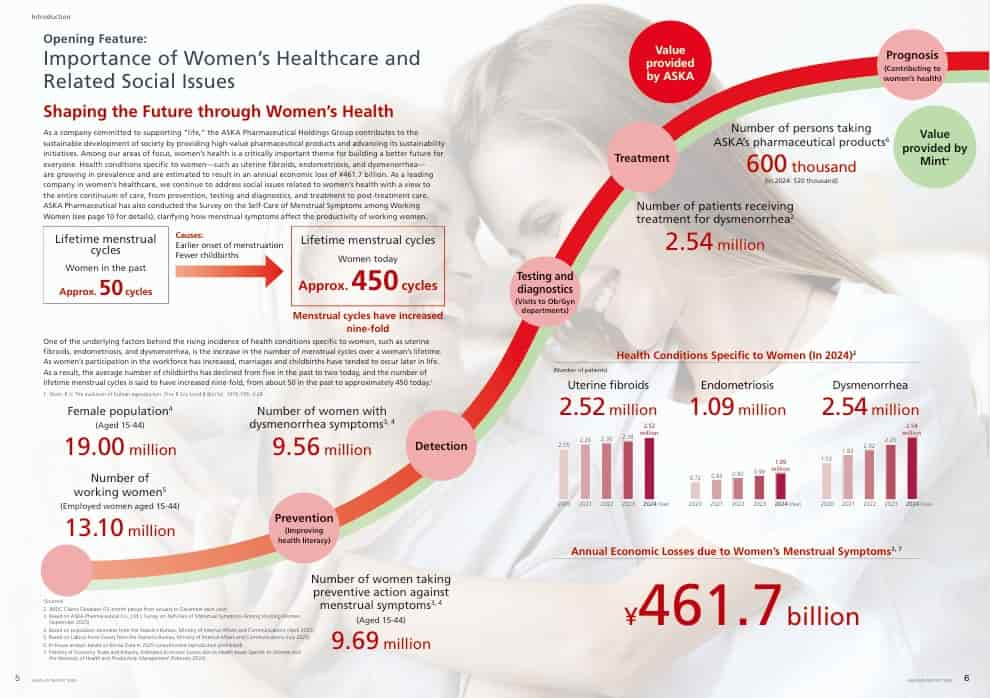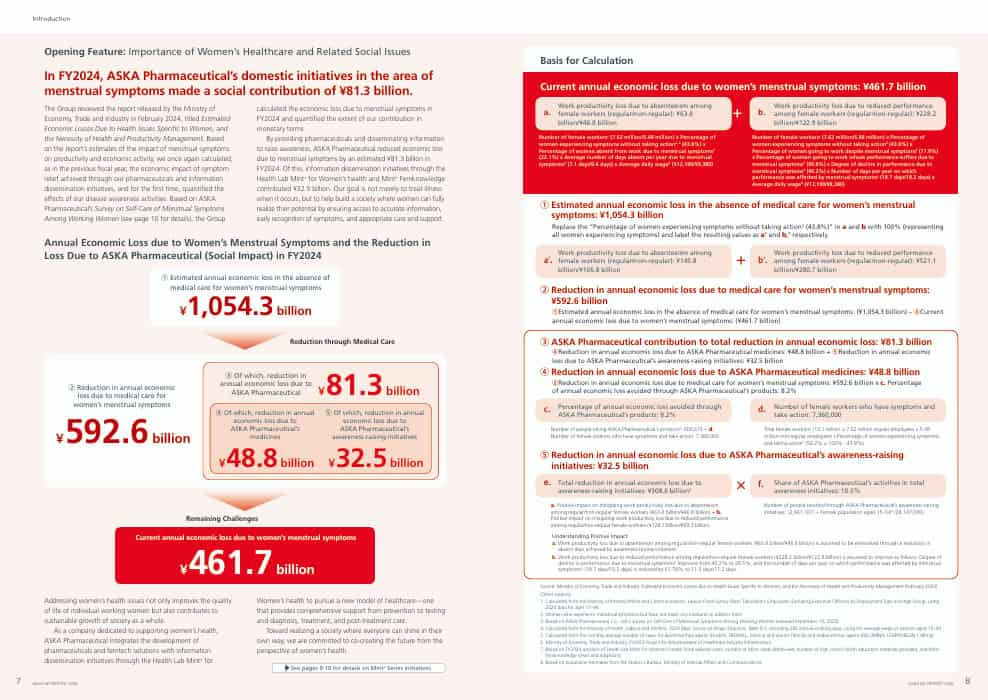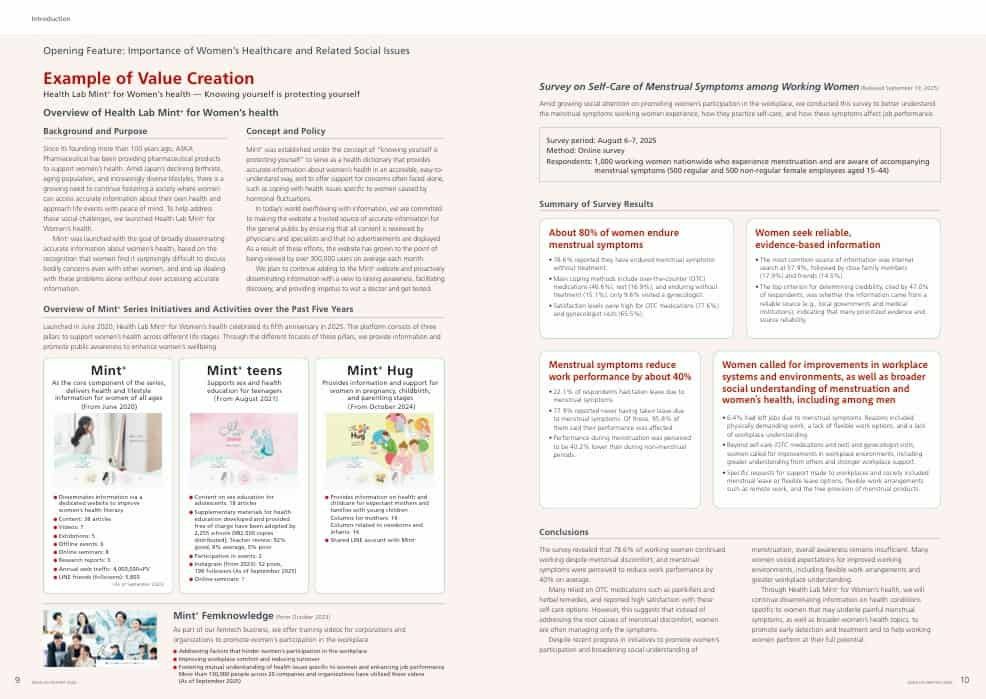Importance of Women’s Healthcare and Related Social Issues
Shaping the Future through Women’s Health
As a company committed to supporting “life,” the ASKA Pharmaceutical Holdings Group contributes to the sustainable development of society by providing high-value pharmaceutical products and advancing its sustainability initiatives. Among our areas of focus, women’s health is a critically important theme for building a better future for everyone. Health conditions specific to women—such as uterine fibroids, endometriosis, and dysmenorrhea— are growing in prevalence and are estimated to result in an annual economic loss of ¥461.7 billion. As a leading company in women’s healthcare, we continue to address social issues related to women’s health with a view to the entire continuum of care, from prevention, testing and diagnostics, and treatment to post-treatment care. ASKA Pharmaceutical has also conducted the Survey on the Self-Care of Menstrual Symptoms among Working Women (see page 10 for details), clarifying how menstrual symptoms affect the productivity of working women.
One of the underlying factors behind the rising incidence of health conditions specific to women, such as uterine fibroids, endometriosis, and dysmenorrhea, is the increase in the number of menstrual cycles over a woman’s lifetime. As women’s participation in the workforce has increased, marriages and childbirths have tended to occur later in life.
As a result, the average number of childbirths has declined from five in the past to two today, and the number of lifetime menstrual cycles is said to have increased nine-fold, from about 50 in the past to approximately 450 today.*
* Short RV:Proc. R. Soc. Lond B. Biol. Sci. 1976; 195, 3-24.

Click to view the PDF.
Value Creation
In FY2024, ASKA Pharmaceutical’s domestic initiatives in the area of menstrual symptoms made a social contribution of ¥81.3 billion.
The Group reviewed the report released by the Ministry of Economy, Trade and Industry in February 2024, titled Estimated Economic Losses Due to Health Issues Specific to Women, and the Necessity of Health and Productivity Management. Based on the report’s estimates of the impact of menstrual symptoms on productivity and economic activity, we once again calculated, as in the previous fiscal year, the economic impact of symptom relief achieved through our pharmaceuticals and information dissemination initiatives, and for the first time, quantified the effects of our disease awareness activities. Based on ASKA Pharmaceutical’s Survey on Self-Care of Menstrual Symptoms Among Working Women (see page 10 for details), the Group calculated the economic loss due to menstrual symptoms in FY2024 and quantified the extent of our contribution in monetary terms. By providing pharmaceuticals and disseminating information to raise awareness, ASKA Pharmaceutical reduced economic loss due to menstrual symptoms by an estimated ¥81.3 billion in FY2024. Of this, information dissemination initiatives through the Health Lab Mint+ for Women’s health and Mint+ Femknowledge contributed ¥32.5 billion. Our goal is not merely to treat illness when it occurs, but to help build a society where women can fully realize their potential by ensuring access to accurate information, early recognition of symptoms, and appropriate care and support.
Addressing women’s health issues not only improves the quality of life of individual working women but also contributes to sustainable growth of society as a whole. As a company dedicated to supporting women’s health, ASKA Pharmaceutical integrates the development of pharmaceuticals and femtech solutions with information dissemination initiatives through the Health Lab Mint+ for 7 Women’s health to pursue a new model of healthcare—one that provides comprehensive support from prevention to testing and diagnosis, treatment, and post-treatment care. Toward realizing a society where everyone can shine in their own way, we are committed to co-creating the future from the perspective of women’s health.

Click to view the PDF.
価値創造事例
Overview of Health Lab Mint+ for Women’s health

Click to view the PDF.